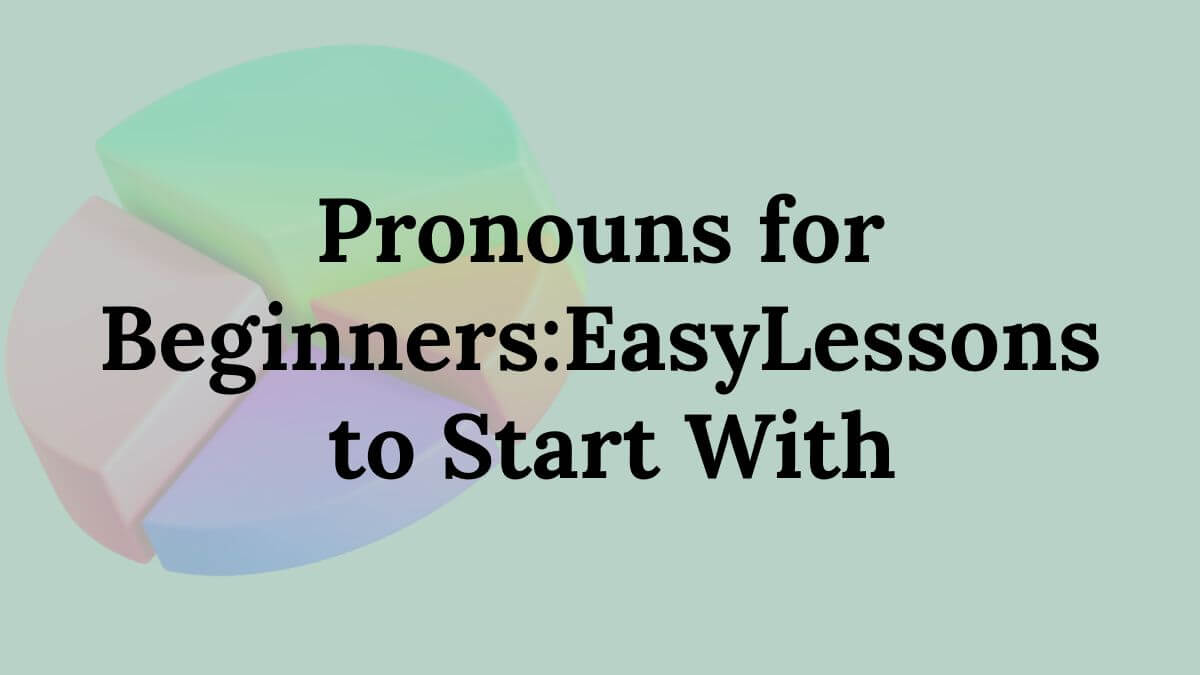Pronouns for Beginners: Learn the basics of pronouns with clear explanations, simple examples, and easy tips to improve your English grammar skills .Pronouns are small but powerful words that make our sentences smoother and less repetitive.
Whether you’re just starting your English grammar journey or teaching it to someone else, mastering pronouns is one of the first essential steps. In this beginner-friendly guide, we’ll walk you through everything you need to know – what pronouns are, how they work, and how to use them confidently in your speaking and writing.
What are Pronouns?
Pronouns for Beginners starts with a simple idea: they are words that take the place of nouns. Instead of saying Maria is kind. Maria helps her friends., You can say Maria is kind. She helps her friends. The word she is a pronoun. It replaces Maria in the second sentence and makes your language smoother and less repetitive.
Why Pronouns Matter
- They make sentences shorter and clearer.
- They avoid unnecessary repetition.
- They help improve communication flow.
Using pronouns correctly is a key part of understanding and speaking English with confidence.
Types of Pronouns in English
There are several different kinds of pronouns. Here’s a quick breakdown of the most important types for beginners.
Personal Pronouns
These refer to specific people or things. Pronouns shift their form based on whether they’re doing the action or receiving it in a sentence.
Examples:
- I, you, he, she, it, we, and they
- me, you, him, her, it, us, and them (object)
Example sentences:
– He is my brother.
– She likes ice cream.
– They are coming over.
– Can you help me?
Possessive Pronouns
These show ownership or possession.
Examples:
mine, yours, his, hers, ours, theirs
Example:
– This book is mine.
– That pen is hers.
Reflexive Pronouns
These reflect the subject back to itself.
Examples:
myself, yourself, himself, herself, itself, ourselves, yourselves, and themselves
Example:
– She made it herself.
– I taught myself to play guitar.
Demonstrative Pronouns
These point to specific things.
Examples:
this, that, these, those
Example:
– This is delicious.
– Those are my shoes.
Interrogative Pronouns
These are used to ask questions.
Examples:
who, whom, whose, what, which
Example:
– Who is calling?
– What are you doing?
Relative Pronouns
These connect clauses or phrases to a noun or pronoun.
Examples:
who, whom, whose, which, that
Example:
– The man who called you is here.
– The book that I read was amazing.
Pronouns for Beginners
Using pronouns for beginners may seem confusing at first, but with practice, they become easy to understand. Here are some simple strategies to help you learn faster.
Practice Replacing Nouns
Take a sentence and replace the noun with the correct pronoun.
Original: Lena is my best friend. Lena lives next door.
Improved: Lena is my best friend. She lives next door.
Be Careful with Subject and Object Pronouns
Make sure you know the difference between using he and him, or they and them.
Example:
– He likes chocolate. (subject)
– I saw him at the store. (object)
Learn Through Conversation
Talk to yourself or others using simple sentences that include pronouns.
Example: I am happy today. Are you feeling okay?
Use Flashcards or Lists
Create a list of all pronouns and review them regularly. Write your own sentences to build confidence
Common Mistakes Beginners Make with Pronouns
Even though pronouns for beginners are simple, learners often make mistakes. Let’s look at a few common errors and how to fix them.
Mistake #1: Confusing Subject and Object Pronouns
Incorrect: Me went to the store.
Correct: I went to the store.
Mistake #2: Forgetting to Match Pronouns with Verbs
Make sure your pronoun agrees with your verb.
Incorrect: They is happy.
Correct: They are happy.
Mistake #3: Repeating Nouns Unnecessarily
Incorrect: Jack is funny. Jack likes to tell jokes.
Correct: Jack is funny. He likes to tell jokes.
Fun Practice Activities for Beginners
Learning grammar doesn’t have to be boring. Try these simple activities to master pronouns for beginners.
Pronoun Matching Game
Create two sets of cards: one with nouns and one with pronouns. Match them correctly!
Fill-in-the-Blank Worksheets
Create sentences with missing pronouns and fill them in.
Example: ______ is my best friend.
(Answer: She)
Pronoun Story Challenge
Write a short story using as many pronouns as possible. Then try rewriting it using nouns instead
How Teachers Can Help Beginners Learn Pronouns
If you’re an educator, teaching pronouns for beginners can be both fun and rewarding. Use visuals, simple sentence-building games, and interactive speaking activities to reinforce concepts. Encourage your students to practice daily and give positive feedback when they use pronouns correctly.
Conclusion
Learning pronouns may seem small, but they play a big role in mastering English grammar. With a little practice, beginners can quickly understand and start using them in everyday conversation and writing.
Keep it simple, stay consistent, and don’t be afraid to make mistakes – each step helps you grow. So whether you’re a student just starting out or a teacher helping others, pronouns for beginners are the perfect place to begin your grammar journey.
